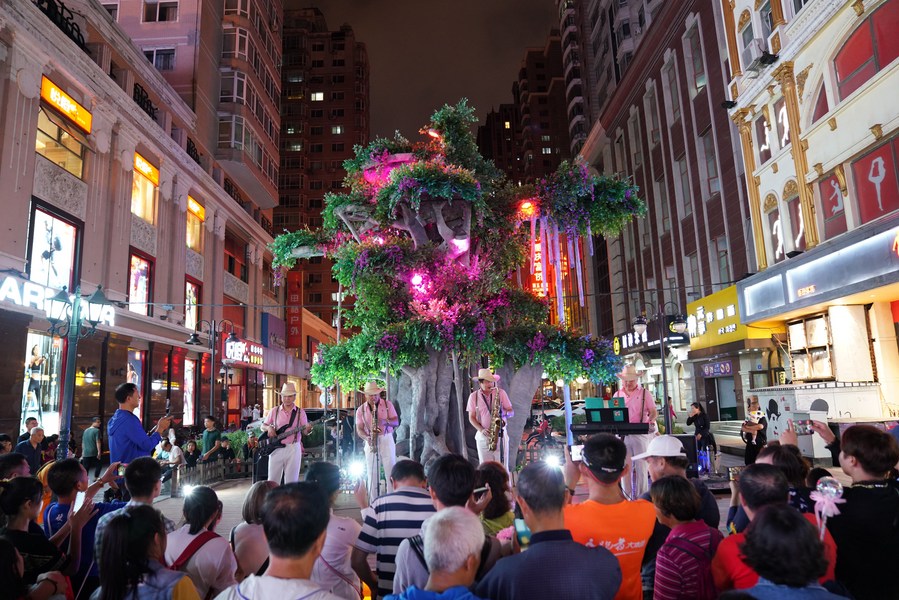Music traditions stoke artistic passion in China's ice city

People enjoy performance on the Central Street in Harbin, capital of northeast China's Heilongjiang Province, Aug. 24, 2019. (Xinhua/Wang Jianwei)
Amateur musicians playing violins, saxophones and even Chinese zithers alongside professionals in public squares and balconies of Central Street in Harbin, northeast China's Heilongjiang Province, has become a unique attraction among tourists.
"Harbin is famed for its winter sceneries, but I'm amazed by the variety of music events in this city," said Xie Yanwen, a tourist from east China's Jiangsu Province.
The tradition of music is deeply rooted in the history of Harbin, known as China's "ice city." In the Harbin Music Museum, traditional Chinese instruments like the erhu and the gehu are played alongside the violin and the piano, illustrating the stories of Chinese and Western musicians.
For thousands of years, local ethnic minorities such as Hezhen and Oroqen have cultivated a rich collection of folk songs and dances. In the 20th century, the development of the Chinese Eastern Railway brought Western music to Harbin.
Since then, a large number of European singers, performers and conductors have moved to Harbin, making it one of the earliest cities in China to embrace Western classical music. Many of China's leading classical musicians have been trained in Harbin or were taught by teachers trained in Harbin.
"The convergence of Chinese and Western music shaped the unique character of Harbin, attracting art connoisseurs from all over the world," said Miao Di, curator of the Harbin Music Museum.
Harbin has been a nursery for artists and artistic marvels thanks to its rich musical heritage and culture. Renowned Chinese theatre performers, composers and singers have promoted the city's incredible art to the entire country and the world.
As the longest-running musical event in China, the China-Harbin Summer Concert has been held for 35 years. Masterpieces such as "On the Island of the Sun" and "I Love the Snow in the North" were sung from here for the rest of the world.
"Harbin has a musical heritage that blends the East and the West. We want to revitalize this tradition and take it to a higher level," said Sha Xiaodong, deputy director of Harbin Cultural Broadcasting and Tourism Bureau.
In recent years, Harbin has fostered the integration of fine art and public culture, providing residents with more opportunities to pursue their musical aspirations.
In March 2016, the brand-new Harbin Grand Theatre opened to the public. The grand venue, resembling a silver ribbon in the sky with soothing aesthetics, put on nearly 200 performances in a single year.
In the same year, the Harbin Conservatory of Music was established on the north bank of the Songhua River.
"We have introduced high-quality teaching equipment, built a first-class concert hall, and organized numerous free concerts for the public," said Li Lei, a professor at the conservatory.
It is not unusual to encounter individuals playing violins, beating African drums, or dancing to the music at bus stops and public squares in Harbin.
"The general public enjoys music and has a good taste in music. They are both music performers and listeners," Sha said.








